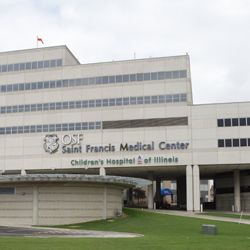
Laying the groundwork for large-scale healthcare changes…
With the arrival of the new year comes perhaps the biggest change in healthcare in 16 years: the full rollout of the Affordable Care Act (ACA). Some elements of the legislation have been in effect since 2010, and OSF Saint Francis Medical Center has been laying the groundwork for nearly two years as a Pioneer Accountable Care Organization (ACO) with the Center for Medicare and Medicaid Services.
As chief operating officer for accountable care and senior vice president of government relations for OSF Healthcare System, Tara Canty is overseeing the implementation of the ACA, and fielding the questions that naturally come with such a change.
“The Balanced Budget Act had a greater financial impact than the ACA will,” says Canty. The BBA, signed into law in 1997, contained the largest reductions in federal Medicaid spending since 1981, but there’s been more political and public outcry surrounding the ACA. “There has been other legislation that dealt with Medicare or Medicaid, what people perceived as an isolated part of the population—it didn’t affect them,” Canty explains. “The ACA is still targeting an isolated population—those who don’t have insurance—and it’s the first time the government is providing for the general population, so we’re seeing a far different reaction.”
One of the key changes for hospitals: the federal government can withhold Medicare payments to a hospital if a patient is readmitted with certain conditions within 30 days of discharge. That means hospitals need to do a good job caring for a patient not only during their hospital stay, but afterward as well. OSF Saint Francis implemented a number of initiatives because of our ACO work, including making sure patients have any prescriptions filled before they leave the hospital. Follow-up calls by patient care liaisons make sure a patient is taking his or her medicine and makes it to any follow-up visits.
OSF Saint Francis has always focused on quality inpatient care when it comes to avoiding hospital-acquired infections. Now, there is a financial hit that could be triggered if we don’t meet government standards. The complete financial impact of the ACA remains to be seen as everyone will now be required to have insurance or pay a penalty. You have until the end of March to enroll.
“Everyone may not like the individual mandate, but millions who want insurance, who have been unable to get it, can now get it,” says Canty. “But for the premiums to work, everybody has to sign up either for expanded Medicaid coverage or their own policy. It’s a math equation—you need a bigger pool to participate for it to work. The ACA may not work if only sick people enroll.”
Approximately 40 million people in the U.S. were uninsured prior to the establishment of the Health Insurance Marketplace. OSF alone provided millions in charity care each year for those who had no insurance or no means to pay for services.
Canty hopes the political rancor surrounding the marketplace rollout and full implementation of the ACA subsides, and people focus on the positives. “Before, when you came to the hospital, you were treated and discharged. There was no coordination of care—you just took care of the event. Now, we follow the patient wherever they go within our system, far outside the walls of the hospital or doctor’s office, addressing non-medical needs as well, and taking a more holistic approach. We’ve set aside the volume equation.
“We get paid to do the right thing at the right time for the patient.” iBi
Shelli Dankoff is the senior media relations specialist at OSF Saint Francis Medical Center.

